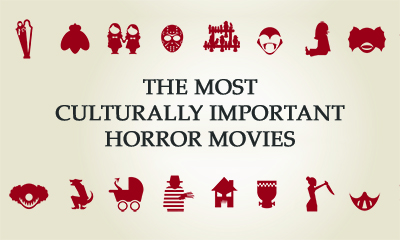 I am currently working on a long-term project about horror movies, which should be ready early next year. In the meantime, the occasion of Halloween affords me a good excuse to start to talk about the genre, specifically which are the most culturally important horror movies.
I am currently working on a long-term project about horror movies, which should be ready early next year. In the meantime, the occasion of Halloween affords me a good excuse to start to talk about the genre, specifically which are the most culturally important horror movies.
As part of my research, I wanted to find a way to measure the cultural impact of horror movies. Clearly, this is a huge topic upon which PhDs can be claimed so I shall limit this to a very narrow question: Which horror movies have been referenced most often in other movies and TV shows?
Which are the most culturally important horror movies?
Using data from IMDb and Wikipedia, I put together a dataset of the most-referenced horror movies. On top is Alfred Hitchcock’s Psycho which has been referenced in well over 1,000 movies and TV shows.
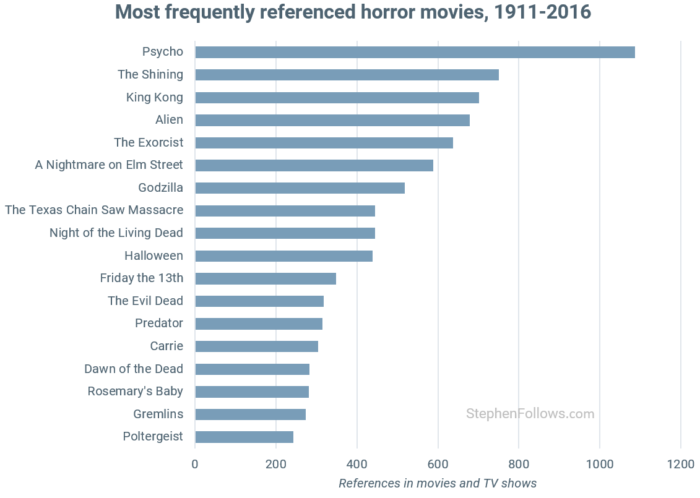
The references tracked here include a wide variety of mentions, from a line of dialogue right through to a full-blown parody or spoof.
Interestingly, Psycho is more often referenced in movies than in TV shows. My guess is that this is due to the main iconic moment of Psycho being a brutal shower-based murder. It’s harder to reference this in TV shows where regulation of unsavoury content is stronger than in movies.

Notes
In the chart above I excluded movies which centred around a character originating in another medium, including Frankenstein’s monster and Dracula.
Over 600 movies and TV shows reference the character of Frankenstein’s monster, but only some are related to 1931 classic movie Frankenstein starring Boris Karloff.
For example, in Shrek 2, the creation of Mongo the gingerbread man (YouTube clip) is shown via a shot of Dury Lane during a stormy night and a shout of “It’s aallliivvveee!”. This is a direct reference to the 1931 movie (YouTube clip). However, another film released in the same year, Van Helsing, also features the character of Frankenstein’s monster but is arguably referring to the character from the original book, rather than the 1931 film (YouTube clip).
Epilogue
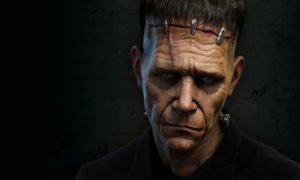 One of the fun things about studying horror movies is that you’re never far away from a lexicological and philosophical minefield. Let me take you on a quick journey into one such minefield, starring Frankenstein:
One of the fun things about studying horror movies is that you’re never far away from a lexicological and philosophical minefield. Let me take you on a quick journey into one such minefield, starring Frankenstein:
Level one – In this article, I’ve been careful to refer to “Frankenstein’s monster” rather than “Frankenstein” because the titular character of the book is Dr Frankenstein who conducts the experiment, not the monster he builds. Frankenstein ≠ Monster
Level two – However, there is a witty retort which states “Knowledge is knowing that Frankenstein is not the monster. Wisdom is knowing that he is“. I tried to source this quote but there doesn’t seem to be a recognised origin. That said, if you want to believe Yahoo Answers then it was authored by “Socrates or Plato, Aristotle maybe?” Frankenstein = Monster
Level three – Anyone who has read the original book will know that Dr Frankenstein wasn’t a man of evil intent. He suffered from hubris and maybe a God-complex but to call him a ‘monster’ is a bit of a stretch. Frankenstein ≠ Monster
Level four – The doctor refers to the monster as his son and therefore it would presumably take his surname of Frankenstein. Frankenstein = Monster
Level five – Dr Frankenstein built the monster over a two-year period while studying at the University of Ingolstadt… which means he wouldn’t yet have received his doctorate. Frankenstein ≠ Doctor
I stopped my research here as I think it’s fair to say I was getting distracted from the movie-centric aim of this blog. I have no doubt that further levels of disentangling are possible but not without creating an army of beings to support the work. Now there’s an idea…

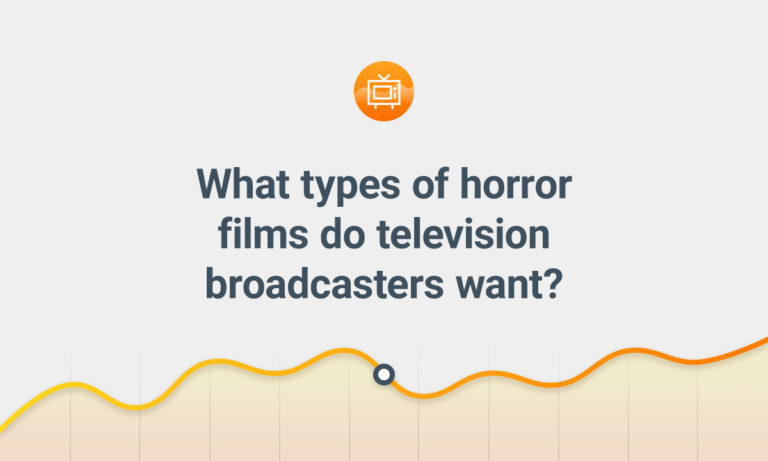
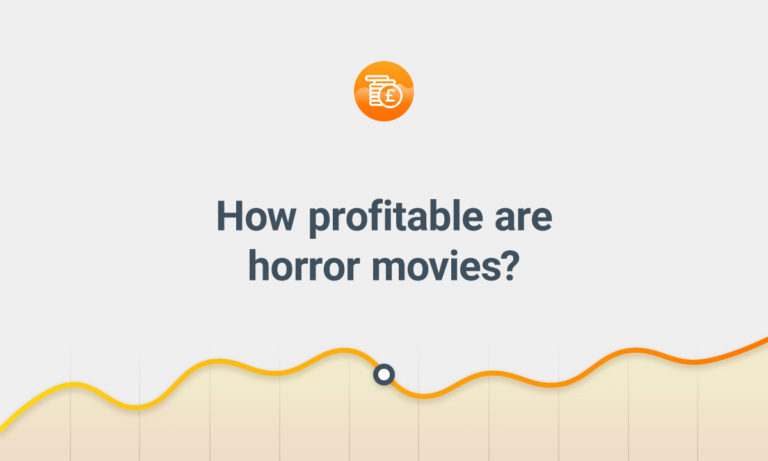
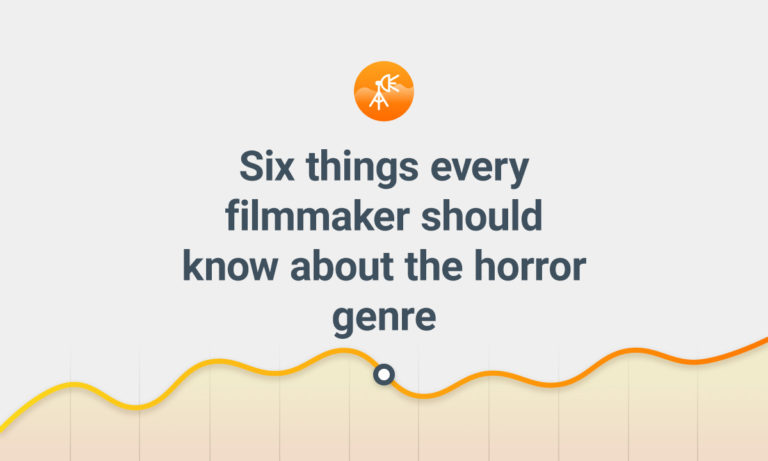

Comments
If you are excluding “Frankenstein” because the character originated in another medium, then why are “Psycho”, “The Shining”, “The Exorcist” and “Rosemary’s Baby” included? They are all based on books.
Hi Nick
There’s no doubt that my method is highly subjective. My rationale is that when people refer to Frankenstein, they mean the character, rather than one single film. Whereas, I doubt if you asked people about “Psycho”, “The Shining” and “The Exorcist” they would even know it’s based on existing material. When referring those films they are specifically referencing the single film version.
Hi Stephen,
I was just wondering what your definition of a ‘horror’ film is? Because I wouldn’t have necessarily considered King Kong, Godzilla or Predator as ‘horror films’, per se. To me they’re more, I don’t know… sci-fi/action? Not a criticism, I’m just curious as to how you define it.
Hi Cameron
That’s a really good question, and one I’m actually going through on a big scale right now. I am working on a horror report and the question of what is and isn’t a horror film keeps coming up.
For the sake of large data explorations, I tend to use the majority verdict of about ten databases (IMDb, Wikipedia, All Movie, The Numbers, Box Office Mojo, Rotton Tomatoes, and some others). However, this doesn’t really get to the heart of your question.
For example, Van Helsing (2004)…
Sites not referring to it as a horror movie:
IMDb: Action, Adventure
Wikipedia: dark fantasy action-adventure film
Metacritic: Action, Adventure, Drama, Mystery, Thriller, Fantasy
The Numbers: Action
Amazon: Action & Adventure
Sites which do call it a horror movie:
All Movie: Action, Horror
Box Office Mojo: Period Horror
Rotten Tomatoes: Action & Adventure , Horror
The shortest answer I’ve found is – it depends who’s asking (and who the audience is).
I am a budding filmmaker from India and I want to one day run my own production house. I have learnt so much from your blog, I wish to subscribe. My heroes are Irving Thalberg, Warren Beatty(the producer), Robert Evans and Val Lewton. Great topic this though I’d have put The Exorcist on top. Alien is my favorite film ever but I don’t get scared of it.
i know and i’m watching some horror movie i don’t like this catégory but i love just an history for a movie named Green Room is the best movie what i watched thank you